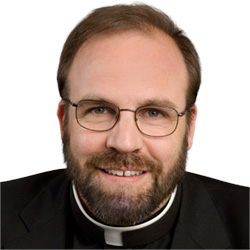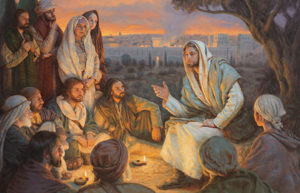Pope vs. Pope on the “Our Father”
Late last year the Italian bishops’ television channel, TV2000, broadcasted a series of conversations between the pope and a Catholic prison chaplain looking at the Lord’s Prayer line by line. The episode broadcast on December 6, 2017 focused on the line, “Lead us not into temptation.”
Pope Francis suggested the Church should amend the translation of the “Our Father” to clear up the confusion around the phrase, “Lead us not into temptation.” “That is not a good translation,” the pope said in the December 6th interview with Italian television. 
“I’m the one who falls,” Pope Francis explained. “But it’s not God who pushes me into temptation to see how I fall. No, a father does not do this. A father helps us up immediately.” “The one who leads us into temptation is Satan,” the pope said. “That’s Satan’s job.”‘
A possible alternative to “Lead us not into temptation” is “Do not let us fall into temptation.” In his interview, Pope Francis suggested that the phrase be adopted more widely. I was surprised to learn Catholics in several countries have used a new translation for some time. “Do not let us fall into temptation” is currently used by the Church in France, Spain, Belgium and Benin. In Italy, “Do not abandon us in temptation” has been used since 2008.
There are no Bible stories or saints’ tales I can recall where God leads a person towards temptation. The one prominent story of Jesus being tempted in the desert was through his encounter with Satan. God didn’t lead Eve to eat and offer the forbidden fruit. There are hundreds of anecdotes of tempted saints, but they feature demons, devils or sexy women.
The National Catholic Register, a conservative bi-weekly, devoted major space in its December 24, 2017 edition to the Our Father line translation, with a front-page story and editorial rebutting the pope’s suggested change. The reasoning to oppose a change was either theological, political or emotional. 
The author of the article was Msgr. Charles Pope, pastor of Holy Comforter-St. Cyprian parish in Washington, DC. He is a contributor to Community in Mission, a blog of the the Archdiocese of Washington, DC. In his article, Msgr. Pope elaborated on three key points:
- “While the intention may be to assist the reader to understand that God does not tempt us or directly cause us to fall, the effect is to imply that the inspired Greek text is inadequate.”
- “Second, in the English-speaking world, the Lord’s Prayer is one of the few prayers we have in common with non-Catholics. Even many of the unchurched have committed it to memory.”
- “Lastly, by changing the line we will miss a “teachable moment” in which an important truth about God can be explained.”
“Surely God does not tempt us in any direct sense,” Msgr Pope reasoned. “He does not will to entrap us or to confound us so as to make us fall. However, because he is the first cause of all existing things, he is also the first cause of things that tempt us. So, in asking God to “lead us not into temptation,” we ask him, who, providentially holds us and all things in existence, to lead us forward with the graces we need to resist it. This will allow us to enjoy the good things he gives without giving way to the temptations of inordinate desires.”
Msgr. Pope’s analysis is good, and it is worth pondering as a spiritual reflection. But his explanation on the meaning of one line involves a long and very intellectual argument–counter intuitive to a simple petition. Msgr. Pope concludes that we should “remain rooted in the translation of the Lord’s Prayer that has sustained and united the English-speaking world for hundreds upon hundreds of years.”
This statement by Msgr. Pope is not entirely accurate. Since the Reformation, Christians have disagreed on the wording and translation of another line in the Lord’s Prayer: “Forgive us our trespasses, as we forgive those who trespass against us.” Catholics, Orthodox, Lutherans, Methodists and most Anglican/Episcopalians use this version. Presbyterians and other Christians use, “Forgive us our debts, as we forgive debtors.” Some Christians replaced “trespasses” and “debts” with “sins.” The different words have different meanings in the ‘English language. “Trespasses” means having crossed a line that may or may not have been clearly marked. “Debtors” implies someone owes you and hasn’t settled the debt. What we hear from the prayer depends on the words we use.
I have started to say: “Do not let us fall into temptation” when I say the Our Father in prayer or at Mass. I was glad to let go of “Lead us not into temptation,” which I have always felt was antithetical to trusting God. 
